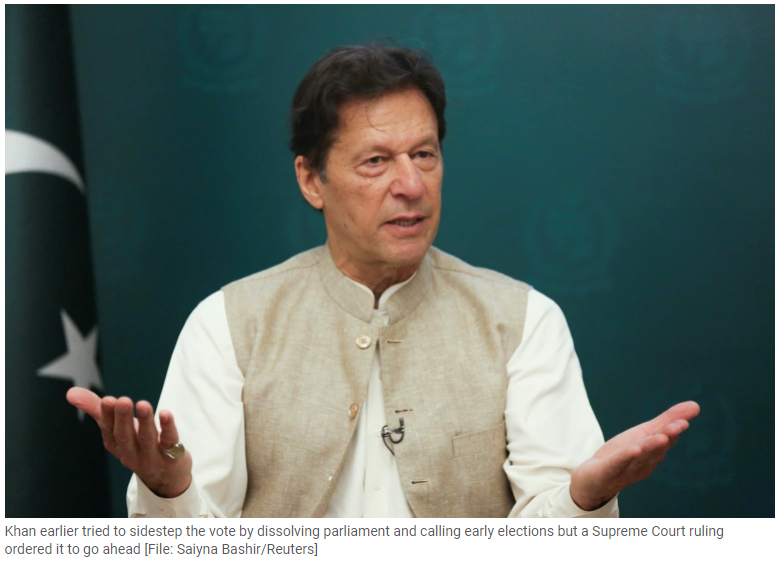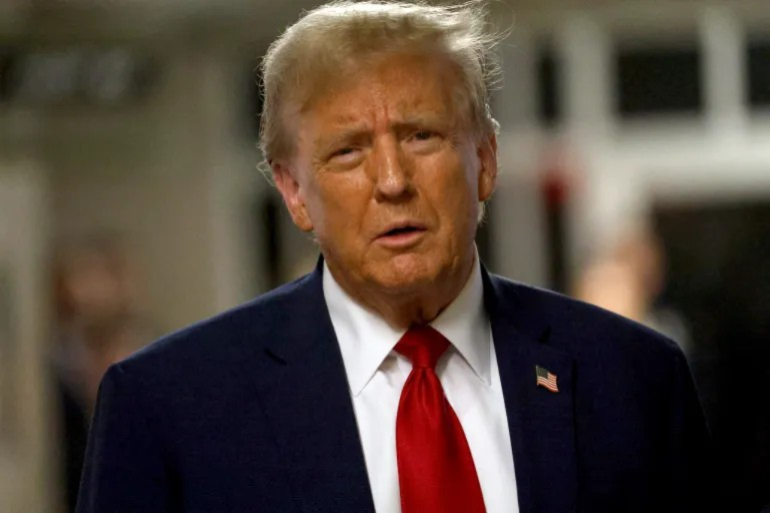Pakistan’s Prime Minister Imran Khan has been deposed by a no-confidence vote in parliament, days after he blocked a similar attempt.
The passing of the motion on Saturday came after the country’s Supreme Court ruled the cricket star-turned-politician acted unconstitutionally in previously blocking the process and dissolving parliament.
The no-confidence motion, which required 172 votes in the 342-seat parliament to pass, was supported by 174 lawmakers.
No Pakistani prime minister has ever completed a five-year term in office in the country’s 75-year history.
Anticipating his loss, Khan, who alleged the opposition colluded with the United States to unseat him, on Friday called on his supporters to stage rallies nationwide on Sunday.
Khan’s options are limited and should he see a big turnout in his support, he may try to keep the momentum of street protests as a way to pressure parliament to hold early elections.
Khan earlier tried to sidestep the vote by dissolving parliament and calling early elections, but a Supreme Court ruling ordered the vote to go ahead.
“We will not seek revenge. We will not put people in jails, but the law will take its course,” Pakistan opposition leader Shehbaz Sharif said in a speech after the vote.

It is widely expected that Sharif – the younger brother of former three-time prime minister Nawaz Sharif – will replace Khan on Sunday or Monday.
Khan became the first prime minister in the country’s history ousted through a vote of no confidence, the only constitutional way to remove the head of government in Pakistan.
Khan, 69, surged to power in 2018 with the military’s support, but recently lost his parliamentary majority when allies quit his coalition government.
Opposition parties say he has failed to revive an economy battered by COVID-19 or fulfil promises to make Pakistan a corruption-free.
Earlier, lower house Speaker Asad Qaisar, a member of Khan’s Pakistan Tehreek-e-Insaf party, who adjourned the house three times on Saturday, announced his resignation, heightening the drama in the chamber.
“The country’s interests must be the priority,” he said.
Whoever becomes Pakistan’s next prime minister will inherit the same issues that bedevilled Khan.
A poorly performing economy, attacks by armed groups, and shaky relations with former allies will top the agenda for the next administration.
Read more>>Comparison Between Ukraine and Russia’s militaries
WANT TO HIRE WEBSITE DESIGNER CONTACT US @Kalda-Tech Systems , See a sample of our work
The incoming government will need to stave off “multiple challenges on domestic and foreign relations levels”, said Professor Jaffar Ahmed, director of the Institute of Historical and Social Research.

Crippling debt, galloping inflation, and a feeble currency have combined to keep growth stagnant for the past three years with little prospect of genuine improvement.
“We don’t have any direction,” said Nadeem ul Haque, vice-chancellor of the Pakistan Institute of Development Economics, a research organisation in Islamabad.
“Radical policy reforms are needed to turn around the economy.”
Imran Khan #ImranKhan









